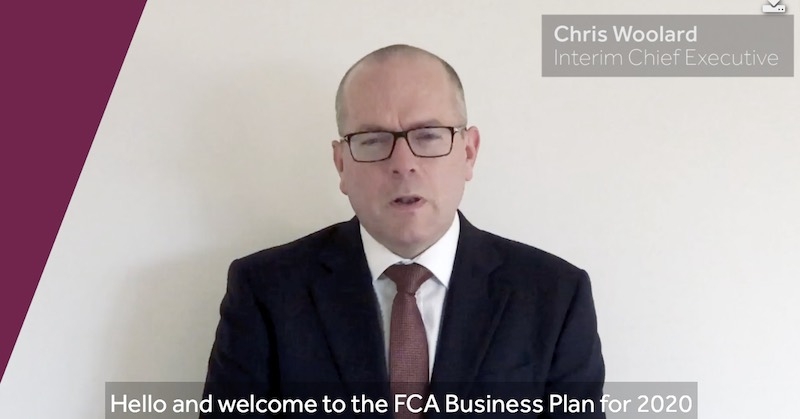The FCA plans to freeze its fees for the smallest 71% of financial services firms in response to the Coronavirus outbreak.
In its Business and Fees Plans for 2020/21 published today the regulator says that in addition it will give small and medium-sized firms an extended period until the end of 2020 to pay their fees.
Larger firms will be expected to pay as usual.
For financial advisers in the A13 block (advisory arrangers, dealers or brokers) there will be a 1.6% fee increase this year but those who pay only the minimum fees will see no increase due to the freeze.
Overall, the watchdog says in its Business Plan 2020/21 its highest priority over the next 12 months will be dealing with the challenge of Covid-19.
While it is helping with fee payments it will also step up monitoring of firms as it expects some to face potential failure due to the pandemic.
It said: “We recognise that Covid-19 will have a significant impact on the viability of a number of firms. There may be further firm failures as a result, and further recourse to the FSCS. A key focus of our work in the coming weeks and months will be to anticipate where those failures may occur.
“We will continue to work closely with FSCS to ensure that, collectively, we have a clear view of the likely future implications of Covid-19, and work with firms to ensure that any failures are managed in an orderly fashion. Therefore, we are putting additional resources into monitoring and analysing firms’ financial positions, so that we can intervene rapidly where necessary. We will continue to discuss how to reduce compensation costs.”
While the FCA is pledging to freeze fees for smaller firms it plans to increase its budget overall by £29.1m or 5.2% to £587.6m for the coming financial year. Fees for firms not covered by the freeze will rise in line with inflation.
The FCA also confirms the cost of the consumer guidance Money and Pensions Service (MAPS) will rise by 21% to reach £130m. The FCA collects the fees to fund MAPS.
In contrast the Financial Ombudsman Service recently announced it would lop £25.4m off its annual budget by using reserves to help keep costs down.
Among other key business priorities this year will be interventions to protect consumers, particularly the most vulnerable, tackling scams, ensuring fair treatment for consumers and small firms and keeping markets working well. Mitigating firm failures will be a priority, says the FCA.
The FCA will also consult on “whether there is industry support for us undertaking a communications and information campaign to tackle areas where we see real risk of consumer harm. This will build on and supplement our existing campaign, ScamSmart.
“We are particularly concerned at the moment about retail investments and the harm caused by fraudulent and high risk illiquid investments and this year we will prioritise helping consumers make better investment decisions.”
The FCA will now consult on its business plan and fees.
Details of the business plan and fee papers are here:
Consultation Paper 20/6: regulated fees and levies: rates proposals 2020/21

